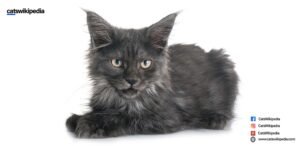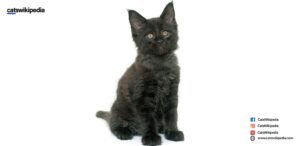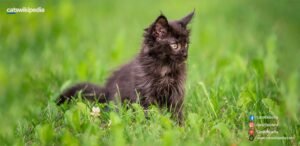BLACK MAINE COON KITTEN
A complete guide to black Maine coon kitten and all you need to know:
Maine Coons are renowned for their very large stature and incredible personality. A mature, adult Maine coon will grow into a kind giant who the family cherishes. They must first continue to expand. Because of their large dimensions and body, kittens of the Maine Coon breed are frequently mistaken for adult cats when they are still fairly young. Though there are many different kinds of kittens available, let’s start with what you should know about caring for a Maine Coon kitten.

1-A Maine Coon Kitten Requires Assistance
A Black Maine Coon kitten is often given to its new owner approximately 12 weeks after birth. Compared to most other breeds, the Maine Coon takes a longer period to mature. It’s not a misprint; they will stop growing in three to five years.
There is a lot of maturing, social norm learning, and experience gaining at this time. They will benefit greatly from living their life but require your assistance to enjoy it fully.
2-Development of Maine Coon Kittens
Usually, between the ages of 12 and 16 weeks, Blac
k Maine Coon kittens are sold to new homes. You are unlikely to receive one before 12 weeks, and if you do receive an offer, you should choose a different seller. In those 12 weeks, the kitten goes through a lot of maturation and still requires its mother. But first, to help you comprehend the kitten adventure, here are some things your cat has already experienced.
Ages 8 Weeks And Under
One breed of cat known for its unusually big stature is the Maine Coon.
Before they are eight weeks old, kittens are still defenseless and incapable of surviving without their mother.
They depend on their littermates because they cannot control their body temperature and kittens for warmth. They will remain gathered early on to survive. Kittens’ eyesight, balance, and coordination are still growing.
It is not advised to separate a young animal from its mother while in care, as it can have disastrous consequences in the wild.
8–12 Weeks of Life
At eight weeks of age, kittens should cease nursing and begin eating specially prepared kitten food.
Additionally, kittens will begin to play. As they jump, run, bite, and investigate their surroundings, they hone vital skills and learn the fundamentals of coordination through play.
Because they are naturally curious, kittens should be kept safe from anything harmful.

Aged 12 to 16 weeks
Your Maine Coon kitten will typically be between twelve and sixteen weeks old when the breeder delivers it.
They are socially adaptive enough to adjust to their new circumstances with reasonable ease, and they are healthy enough to be removed from the mother’s care and placed in different environments. In comparison to adult cats, Black Maine Coon kittens are exceptionally active.
To support their growth, Maine Coon kittens require a high-protein diet, so make sure they eat three or four times a day.
Aged 16 to 24 Weeks
Your Maine Coon kitten should be spayed or neutered before the end of this age range.
They are on the path to becoming the same as a teenager. You can imagine what that would be like if you were a teenager. The foundation of your unique Maine Coons persona will begin to take shape.
24 Weeks to 12 Months
Black Maine Coon kittens will grow more accustomed to their environment during this time.
They will still need to grow a little bit, but after around 12 months, their development will level out, and they will be nearly mature. Enjoy! Upon reaching adulthood, Maine Coons are among the largest breeds of cats. Therefore, their growth requires a lot of food. In its first year alone, a growing Maine Coon kitten can consume anywhere from 300 to 600 calories per day.
After a year, they are still regarded as kittens, possibly until you can switch their diet to adult food after 15 months.
3-Diet of Maine Coon Kittens
Your kitten’s food now will not be the same as it grows into an adult. One thing to keep in mind is that a high-protein diet is necessary for your Black Maine Coon kitten to ensure healthy growth. It is advisable to inquire about the diet and brands of food that the breeder or vendor from whom you purchased your Maine Coon kitten has been raising it.
Stomach troubles caused by diet changes can last a few days while the person adjusts to their new environment. A 12-week-old kitten should generally be fed in tiny, regular doses. Feeding Maine Coon kittens involves distributing food throughout the day, making it an all-day activity.
Black Maine Coon Kittens develop fast; some can gain two pounds in a few weeks. Perhaps three in a few weeks) that they require more nourishment. Food for kittens is high in calories and high in protein. The nutritional requirements of adult cats and Maine Coon kittens are similar, except for the latter’s increased demand for protein and amino acids.
A kitten should get 30 to 40 per cent of its nutrition from protein-rich foods like chicken, turkey, duck, beef, fish, or lamb. Fares based on grains, such as “tuna and rice,” usually have less protein. It is advised that your kitten starts with a diet high in high-quality wet food. Wet food should be favored early on since dry food frequently contains more carbohydrates than protein.
Wet feeds for cats are available from most cat food suppliers in the era of their lives when they are rapidly developing. They would receive the proper nutrition from these to grow properly. Some owners feed their Maine Coon kittens a raw food diet, but if the natural foods aren’t processed, their digestive systems may reject them.
4-What Supplies a Black Maine Coon Kitten Needs
Black Maine Coon kittens require a large amount of space to play and roam. You should provide them with a sizable, secure space that they can’t simply flee. It should eventually have access to an outside area so you can give it the exercise it needs. A food and drink dish that is big enough to prevent accidents during playtime is essential for a Maine Coon kitten.
Toys, scratching posts, and any other essentials must have room. You will most likely need moving or transportation carriers if you plan to move your Maine Coon kitten between different indoor areas. This is a list:
Cat beds; toys; food and water dishes (stainless steel is cleaner than plastic); Name tag on collar; microchip; litter box; cat carrier; brush/kit; treats;
Plastic food bowls allow bacteria to grow much more easily, so the food bowl should be made of ceramic or smooth metal, such as stainless steel. Since Maine Coons enjoy playing, you should make sure the bowls are accessible to them but out of their reach for them to claw at or shift about independently. Because Maine Coon kittens have enormous bodies, if you desire an indoor cat, your kitten will also require a larger-than-typical litter box.

In summary
Black Maine Coon kittens are delightful and make people happy. An owner of a Maine Coon kitten will want to learn about kitten care so they may provide their pet with the best care possible for a long and happy life. In addition to being larger than typical cats, Maine Coons have different nutritional needs than kittens. To ensure that you fully understand everything, the Maine Coon Kitten guide breaks down each component into easy-to-understand words.



